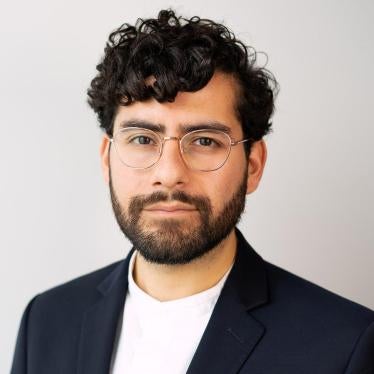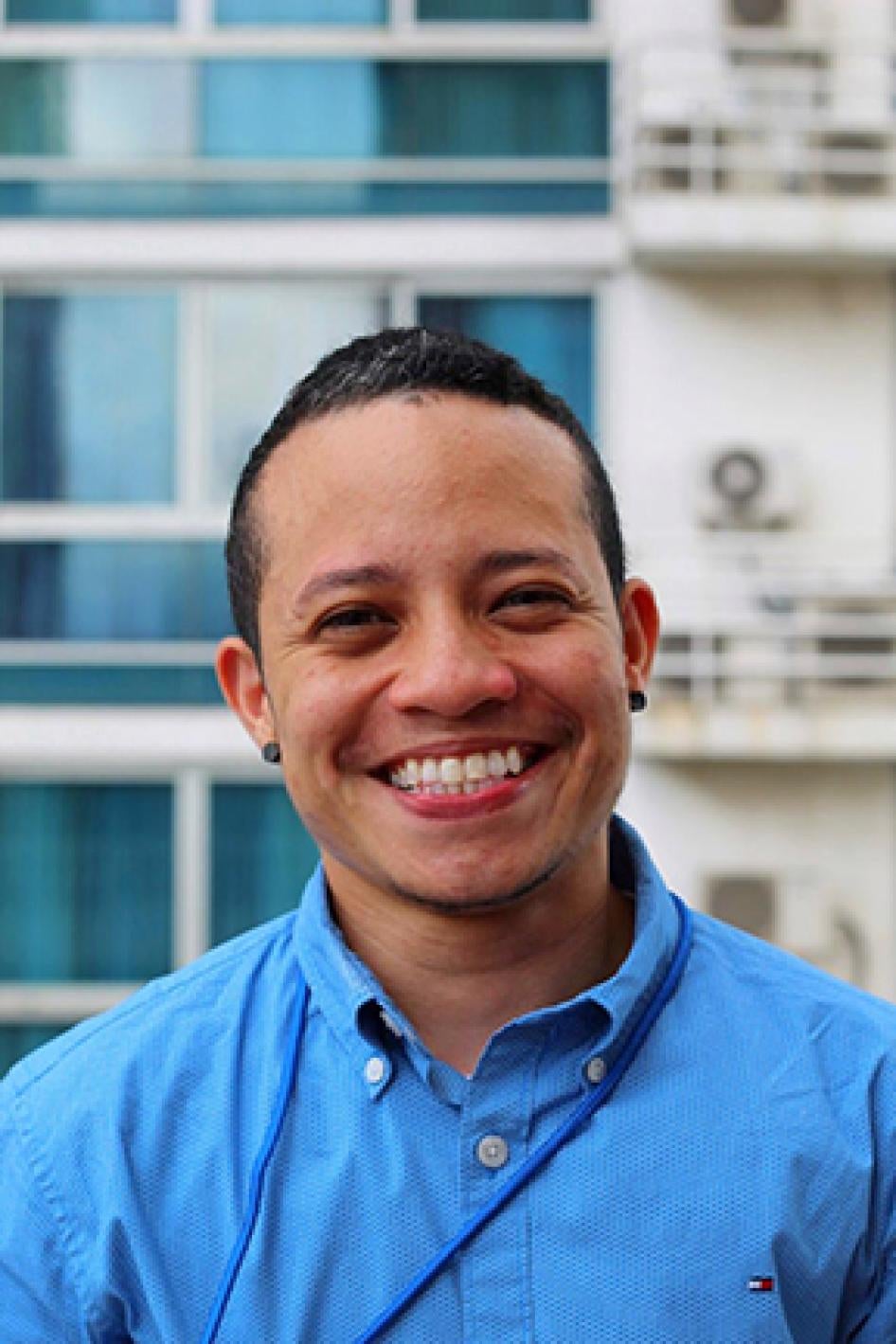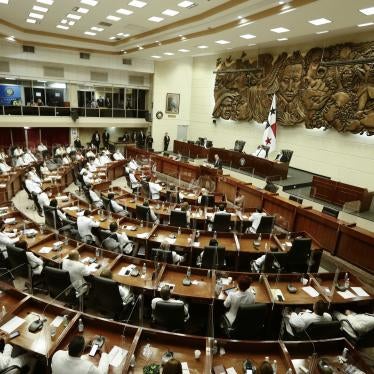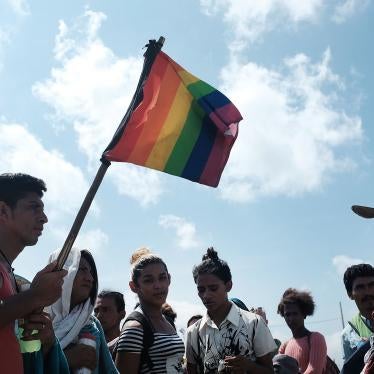I. Introduction
On April 1, 2020, the government of Panama introduced a gender-based lockdown in response to the Covid-19 pandemic. This meant that women and men were only allowed to do essential shopping on alternate days. The country’s Health Ministry described the gender-based quarantine as “the simplest procedure” to reduce the number of people on the streets (Health Ministry of Panama, 2020).
An unintended consequence of this measure was that police and private security guards began to single out transgender people for profiling for being out “on the wrong day.” In some cases, they arrested and fined trans people, or prevented them from buying essential items like food and medication. These cases of discrimination occurred when security agents’ visually identified trans people, or after they checked the sex marker on their national identification cards. The incidents occurred both when trans people sought to respect the quarantine measure based on their gender identity, and based on their sex marker (Human Rights Watch, 2020).
Panama does not have legal gender recognition—a simple, inexpensive, administrative procedure allowing trans people to modify their documents to reflect their gender identity without requiring any pathologizing medical intervention like sex reassignment surgery (Organization of American States, 2020).
This interview with Pau González, the co-founder of Hombres Trans Panamá (Trans Men Panama, HTP), the first trans men’s organization in the country, explains how the gender-based lockdown, which was finally lifted completely in February 2021, was a pivotal moment for the trans community. HTP was one of the national civil society organizations that spearheaded the response to the cases of anti-trans discrimination, urging the government to issue guidelines that would allow trans people to circulate based on their gender identity and, later, to scrap the measure altogether. González explains how the lockdown not only exacerbated the structural inequalities that trans people in the country already experienced, but also forced them to reimagine their community and their activism.
II. Gendered Lockdown
Cristian González Cabrera: How did the gendered measures affect you personally?
Pau González: As soon as the gendered quarantine measures were put in place I felt as if my world was crushed. Life is already difficult as a trans man in such a small, religious country. Now not only did I have to worry about the pandemic, but also about a measure that didn’t consider people like me. My identification documents do not reflect my gender identity because Panama does not have legal gender recognition, nor non-discrimination laws protecting trans people specifically.
To avoid discrimination, I had to stay in my house and rely on friends to assist me with essential shopping, or pay $6.50 for delivery services to bring me these items. I felt like I was under house arrest because going out of my house meant running the chance of being stopped and detained. At times I felt that my mental health was being affected from being at home for over 60 days with my mother, whom I had asked to move in with me in my three-room apartment at the start of the pandemic. I felt anxiety. In some moments I also felt depression, including when trans people began to contact me for help as president of a transgender rights NGO.
CGC: With what sort of issues were trans people contacting you?
PG: In some cases, trans people contacted me with thoughts of suicide, saying that there was no reason to live anymore because they couldn’t leave their homes without discrimination, nor buy essential items. Some trans people live at home with families that discriminate against them and invalidate their gender identity. I told them about available psychological services in the country, but always with fear that those who would provide care would be transphobic. Some told me that they were scared to go out, to get food. At first, I couldn’t do anything because I was in the same situation – stuck at home, unable to leave for fear of discrimination. Then, my colleagues at HTP and I started finding ways to reinvent ourselves, to strategize, and to turn this negative situation into a positive one by figuring out how to get food and services to our community and reaching out to mental health professionals who would be able to help vulnerable trans people.
CGC: Can you say more about what HTP did to help trans people during this time?
PG: We had a Trans Solidarity Network whose goal was to provide food (Hombres Trans Panamá, 2020). It was created with another civil society organization called Fundación Iguales. We identified those trans people who needed food because they were scared to go out and face discrimination. We collected donations from a group called Parents, Families and Friends of LGBTQ+ People in Panama (Asociación de padres de familia, familiares y amigos por la diversidad de Panamá, PFLAG-Panama) to fund the food kits. We also had volunteers, like a cisgender gay man who volunteered to drive his car and bring the food donations to those in need. We also brought medication to those trans people who had medical prescriptions but were scared to leave their homes.
It was much more difficult to get food to people in the more remote provinces of Panama. For example, I had to contact a woman with a kiosk on an island in the Bocas del Toro Province to see if she would accept digital payment for food. The province is an eight-hour drive from Panama City. After some negotiation, she accepted and then brought the food to a trans man on that island.
We ultimately ended up helping approximately at least 200 people from the trans community. Most of those we helped were trans people who were already in a precarious situation before the pandemic, with lower education and often unemployed, like many other trans people in the country due to discrimination. Many of the trans people we helped also did not have access to the benefits the government was providing because they had been living without national identification cards since these did not reflect their gender identity or expression (Sistema Estatal de Radio y Televisión, 2020). Identification was needed to access the benefits. Those who did have them were scared to ask for benefits because of discrimination.
We also recorded cases of discrimination of trans people who were detained, denied access to basic needs, or who otherwise experienced discrimination by police and private security agents. We created an online form where people could register incidents of discrimination and we spread awareness about it online, through word of mouth, and through LGBT organizations across Panama. We recorded 49 incidents of discrimination between April 2020 and February 2021.
We also spoke with state institutions. We were constantly sending letters to the Ministry of Health, the Ministry of Public Security, the Ombudsperson’s Office, the Government Attorney’s Office, and allied congressmembers. At first, we asked for the dignity of trans people to be respected and for the measures to be reviewed to consider trans people. Later, after two pro-LGBT rights statements from the government, but no change for trans people on the ground, we began to ask for the measures to be replaced (Public Security Ministry of Panama, 2020, May 12, July 17). The most helpful interlocutor was Maribel Coco, the former Ombudsperson in Panama – she asked for the measure to be respectful of trans people, which she even said on television (Alvarado, 2020).
CGC: Why do you think that Panama was one of the handful of countries that implemented gendered measures?
PG: Machismo and traditional gender roles. Panama is also a country where religious communities have a strong influence. These communities have a belief that there is man and there is woman and that’s it. These beliefs influence policy, which in the case of the gendered measures meant that the trans community was disregarded. I believe the state should be secular and religious groups should not dictate policy. I believe that to make policies, the government should take into account all vulnerable communities, such as trans people, in its decision-making.
CGC: What do you think the legacy of this measure will be for trans people in Panama?
PG: It gave us the opportunity to make trans people and the discrimination we suffer more visible. It was on television, in the newspapers. If people didn’t know that trans people existed, they now do. We showed that we exist and that we will always find ways to overcome and resist.
Our goal now is to follow up and make sure that there is access to justice for every person who was discriminated against. As of now, only one case demanding accountability for discrimination has received a government response, saying that they have no record of the case.[1] It’s unacceptable to say that they were unaware of the case: authorities must properly investigate and must offer resources and redress to the victim.
III. Trans Rights in Panama
CGC: Covid-19 aside, what is the experience of trans people in Panama today?
PG: There’s a lot of misinformation about trans people. There is not a lot of education on trans existence, and many people think trans people are gay people. People said, “Why don’t you go out on the day of your national identification card?” not understanding what gender identity is and that our documents do not correspond with who we are because our laws are not consistent with international standards.
There is a lot of hate speech on social media from the general public, considering trans people less than human. For example, when we tried to explain that our IDs do not reflect who we are, people online would say, “there is only man and woman and if you are neither you should not go out.” There were messages that said that trans people would go to hell, that we violated the “divine mandates,” and that we were trying to implement “gender ideology”[2] in the country (Case, 2019).
CGC: What is the experience with the police?
PG: The police have their own internal rules, like a clause that prohibits homosexuals from serving as police officers. In their Rules on Discipline for the National Police, it says that it will be considered a “grave” offense to “practice lesbianism … [or] homosexuality” as if it were a disease (Executive Decree No. 204, 1997).
Many times, trans people are left to chance with the police. Our experiences with them will many times depend on who the officer is and how much that person knows about human rights and the LGBT community. They could be indifferent to, supportive of (very few), or against (most) trans people. There is a history of police violence, particularly affecting trans women, many of whom are sex workers and are harassed by the police.
CGC: What legal barriers exist in Panama for trans people to be full members of society?
PG: There are already broad non-discrimination provisions in our constitution and under international treaties, but we need an anti-discrimination law in Panama that explicitly includes all vulnerable groups, including LGBT people. This is important so that the police and the general public don’t do whatever they want to our community. A law won’t solve all the problems because you still need to enforce it, but it can help. Providing consequences for discriminatory behavior would prevent cases.
Lack of legal gender recognition. We need our laws to be updated to international human rights standards. Panama is part of the international human rights system and therefore should comply with the Inter-American Court’s Advisory Opinion 24/2017, which says states should provide a simple, affordable, expeditious, administrative procedure for trans people to change their documents (Inter-American Court of Human Rights, 2017). With such a law, trans people’s documents would reflect who they are and would allow for personal autonomy.
With legal gender recognition, trans people’s right to privacy would also be more respected because they would not have to explain why their documents don’t reflect their gender expression. It would allow us to be ourselves and not suffer so much discrimination in access to health, work, education. For example, if you apply to study or to work, school officials or employers would focus more on your skills and competence not what you look like or what your gender identity is.
CGC: Can you talk about your experience trying to get your identity recognized by the state?
PG: As a trans man I have had a long journey and it is far from over. Sometimes it feels like I won’t live long enough to see myself able to live a full life with all the same rights as cisgender people. I first tried to do my name change in 2017 and the application was rejected. The public official at the Civil Registry was transphobic and she asked me why I wanted to change the name that my mother gave me. I presented her with three pieces of evidence that I had been using my name “Pau,” as the law requires for any name change in Panama: a job letter; a statement from a friend; and a certificate of volunteer work (Tribunal Electoral, 2020). The woman mocked me for thinking that evidence would be enough. I left. I wanted to cry, and felt very discouraged, just like many other trans people have felt when they’ve tried to change their name.
Then finally I submitted an application again in 2018. But this time I jumped into action by asking for a meeting with the directors of the Civil Registry office. After putting pressure on them and calling them consistently about my name change application, they granted a meeting with me, another LGBT rights organization, and a representative of PFLAG-Panama. A year and one month after submitting the application, my name change was completed.
We also began working with the Civil Registry to get other trans people’s names changed on their national identification documents. I felt it was important that this process not be so long and that if there was a law for everyone to be able to change their names, trans people should have access to that right without discrimination or difference. Now an average name change application for a trans person takes 15 to 30 days.
For gender marker change I decided to wait to have my name changed to then request gender marker change. I presented all my paperwork, and they gave me a document stating I needed to have a medical exam in the National Forensics Legal Medical office by law. In order to have the gender marker changed in Panama, they require people to go in a physical exam where they would check their genitals to then determine if the person is male or female (Civil Registry Law, 2007).
Just thinking about it makes me feel sick to my stomach. It is humiliating to have to do such a procedure, not all trans people want to have surgery and not all trans people have the funds to have surgery and those shouldn’t be reasons to deny access to full gender identity recognition. I refuse to undergo this examination as it violates my dignity. I know at least one trans man who underwent this demeaning process unaware of what the process was going to be like as he had just arrived from abroad and was not in touch with trans organizations. He thought he wouldn’t have a problem, but his application was rejected after the physical examination.
IV. Looking Forward
CGC: With the gendered measures lifted since February 2021, what is HTP focusing on now?
PG: We are expanding the Trans Solidarity Network. We are concentrating on developing programs to strengthen members of HTP with skills that allow them to have more chances at getting jobs. For example, we are teaching about how to do a job interview, including with simulations. We saw that many trans people did not believe in themselves when doing job interviews and we hope this will build confidence and skills in the community. We are also having sessions on how to create your own business.
We keep assisting trans people with medical appointments so that they do not self-medicate. Self-medication is when trans people go on the internet and research what hormones others are injecting themselves with and try to do the same, which can be medically dangerous. I know of cases of trans people who are desperate to transition and have injected themselves with hormones for livestock, or with performance-enhancing steroids.
In Panama we do not have a public health system that offers health services for trans people that want to transition. We want to change that. HTP covers part of the costs of a transition process, which can be very expensive. Required lab work can cost up to $160, an appointment with an endocrinologist about $80, and the life-long hormone treatment can be $120 every three months.
We are also working on gender marker change advocacy and preparing to develop a strategy that involves all trans groups and independent trans activists for a gender identity law that respects international standards. We also continue to help more trans people to be able to change their legal names.
CGC: What do you think is needed for there to be a shift in Panama regarding trans rights?
PG: We need a non-discrimination law and legal gender recognition. We also need more education about diversity in schools and in all government institutions, including about sexual and reproductive rights. This will teach people about how to take care of their bodies and about the sexual diversity that exists. In addition, schools need to educate more about human rights and teach critical thinking.
CGC: What gives you hope for trans rights in Panama?
PG: Younger generations. They are more open minded. In HTP, we have younger members, like 18 to 20 years old, and they tell us about how they came out to their friends and their friends accepted them. I am 36 years old – this was not the case when I came out in 2016.
More allies and people willing to walk beside us to make sure we have equal rights for everyone also gives me hope. For example, through the Trans Solidarity Network we got volunteers who were mental health specialists and who became engaged with the community. Now we have partnered with them to offer health services to trans people. This is important for the trans community because they need support in the face of discrimination. We also want to create a protocol for trans health with these and other health professionals. They could serve as a bridge between the trans community and the medical community. We have already created two health manuals on mental health and support groups for trans people, many of whom suffered from anxiety and low self-esteem from incidents of discrimination.
More and more people have become allies and are willing to fight for our rights with us. We have to keep making people aware of the trans experience.
V. Conclusion
In February 2021, Panama scrapped the remaining gender-based measures and has not reinstated them as of March (Alarco, 2021). However, trans activists in Panama continue to monitor Covid-19 restrictions since the government had already revoked the remaining gendered measures in September (Lasso, 2020), only to reinstate them again in December (Rodríguez, 2020).
As Pau González explained, the experience under a gendered lockdown has marked the trans community. It has also led to some promising statements on the part of the government. After significant pressure on the government since April 2020 to respect the rights of trans people, on May 11, the Public Security Ministry stated that it “has spoken with the security sector to prevent any type of discrimination against the LGBTI population” (Public Security Ministry of Panama, 2020, May 12). Then, after the cases of discrimination continued, on July 16, five government ministries and the Ombudsperson’s Office made a statement acknowledging the reports of discrimination against transgender people (Public Security Ministry of Panama, 2020, July 17). The statement denounced homophobia and transphobia and affirmed that Panama respects “the diversity of identity and expression.”
For a country with no legal protections for trans people against discrimination, these statements signaled that, at the very least, the government heard trans people’s voices. While many trans people still wonder to what extent these statements will have an impact on their daily lives, some remain hopeful that the national visibility their issues received in combination with continued pressure could be the start of a new era for trans rights in Panama.
[1] The official response from the Los Santos, Seventh Police Zone, on file with Human Rights Watch, said that “there is no record of incidents with [the complainant] on the date described or close to it,” but it did not indicate whether the police itself conducted an investigation. [author’s translation]
[2] “Gender ideology” is a vacuous catch-all term generally intended to denote an ill-defined gay and feminist conspiracy to wreak havoc on traditional values. This rhetoric spans the globe, first propagated by the Vatican and since sustained by opportunistic politicians and ideologues who seek to limit women’s, adolescents’, and LGBT people’s rights.
References
Alarco, D. M. (2021, February 2). Panama opens restaurants and beaches; removes purchase restriction by gender [English translation of the title]. La Estrella de Panamá. https://www.laestrella.com.pa/nacional/210202/210203-panama-abre-restaurantes-playas-elimina-restriccion-compras-genero
Alvarado, N. (2020, May 20). Quarantine for trans people: the double crisis [English translation of the title]. TVN Noticias. https://www.tvn-2.com/nacionales/Cuarentena-personas-trans-doble-crisis_0_5583191705.html
Case, M. A. (2019). Trans Formations in the Vatican’s War on “Gender Ideology.” Journal of Women in Culture and Society, 44(3), 639—664. https://doi.org/10.1086/701498
Lasso, M. (2020, September 12). Government eliminates movement by gender [English translation of the title]. La Estrella de Panamá. https://www.laestrella.com.pa/nacional/200912/gobierno-elimina-movilidad-genero
Rodríguez P., M. (2020, December 19). Government clarifies that mobility restrictions by sex are exclusive for making purchases [English translation of the title]. La Estrella de Panamá. https://www.laestrella.com.pa/nacional/201219/quedaron-ultimas-medidas-control-sanitario-covid-19-panama
Executive Decree No. 204 [English translation of the title]. (1997). Official Gazette. Article 133. http://gacetas.procuraduria-admon.gob.pa/23371_1997.pdf
Civil Registry Law [English translation of the title]. (2007). Official Gazette. https://www.tribunal-electoral.gob.pa/wp-content/uploads/2017/06/Texto_U_nico_-_Ley_31_y_Ley_17_de_22_de_mayo_de_2007.pdf [author’s translation]
Health Ministry of Panama [@MINSAPma] (2020, March 31) New measures for total quarantine. We need 15 days of maximum protection of the population, to protect life [English translation] [Image attached] [Tweet]. Twitter. https://twitter.com/MINSAPma/status/1245098676290301952?s=20
Hombre Trans Panamá. (2020, June 12). Results of Solidarity Network [English translation of the title]. Retrieved March 1, 2021, from https://ftmpanama.com/2020/06/12/resultados-de-la-red-solidaria/ [author’s translation]
Human Rights Watch. (2020, July 13). Panama: New Trans Discrimination Cases Under Covid-19 Measures. https://www.hrw.org/news/2020/07/13/panama-new-trans-discrimination-cases-under-covid-19-measures
Inter-American Court of Human Rights (2017, November 24). Advisory Opinion 24/17, Series A. No. 24. https://www.corteidh.or.cr/docs/opiniones/seriea_24_eng.pdf
Organization of American States. (2020 May) Overview of the legal recognition of gender identity in the Americas [English translation of the title]. http://clarciev.com/identidaddegenero/public/files/PANORAMA%20DEL%20RECONOCIMIENTO%20LEGAL%20DE%20LA%20IDENTIDAD%20DE%20GENERO%20EN%20LAS%20AMERICAS.pdf
Public Security Ministry of Panama [@MinSegPma]. (2020, May 12). Communiqué | We have given instructions to the security forces, to avoid any type of discrimination against the LGBTI population [English translation] [Image attached] [Tweet]. Twitter. https://twitter.com/MinSegPma/status/1259980297061482497?s=20 [author’s translation];
Public Security Ministry of Panama [@MinSegPma]. (2020, July 17). Communiqué | Our Security Forces respect human rights and reject all types of violence, xenophobia, homophobia, transphobia [English translation][Image attached] [Tweet]. Twitter. https://twitter.com/MinSegPma/status/1283968938825715712 [author’s translation]
Sistema Estatal de Radio y Televisión. (2020, November 30). Panama Solidarity Plan has reached more than 1.6 million people [English translation of the title]. https://sertv.gob.pa/nacionalfm/plan-panama-solidario-ha-alcanzado-a-mas-de-1-6-millones-de-personas/ [author’s translation]
Tribunal Electoral. (2020, February 4). Change, addition, modification and deletion of proper names by right of use and custom [English translation of the title]. Retrieved March 1, 2021, from https://www.tribunal-electoral.gob.pa/cambio-adicion-modificacion-y-supresion-de-nombres-propios-por-derecho-de-uso-y-costumbre/ [author’s translation]
This is an Accepted Manuscript of an article published by Taylor & Francis in Global Public Health on June 23, 2021, available online: https://www.tandfonline.com/doi/10.1080/17441692.2021.1939759.








